人教版高中英语必修一:Unit 3 Travel journal Using language课件(共30张PPT)
文档属性
| 名称 | 人教版高中英语必修一:Unit 3 Travel journal Using language课件(共30张PPT) |  | |
| 格式 | zip | ||
| 文件大小 | 1.0MB | ||
| 资源类型 | 教案 | ||
| 版本资源 | 人教版(新课程标准) | ||
| 科目 | 英语 | ||
| 更新时间 | 2016-11-05 20:28:15 | ||
图片预览

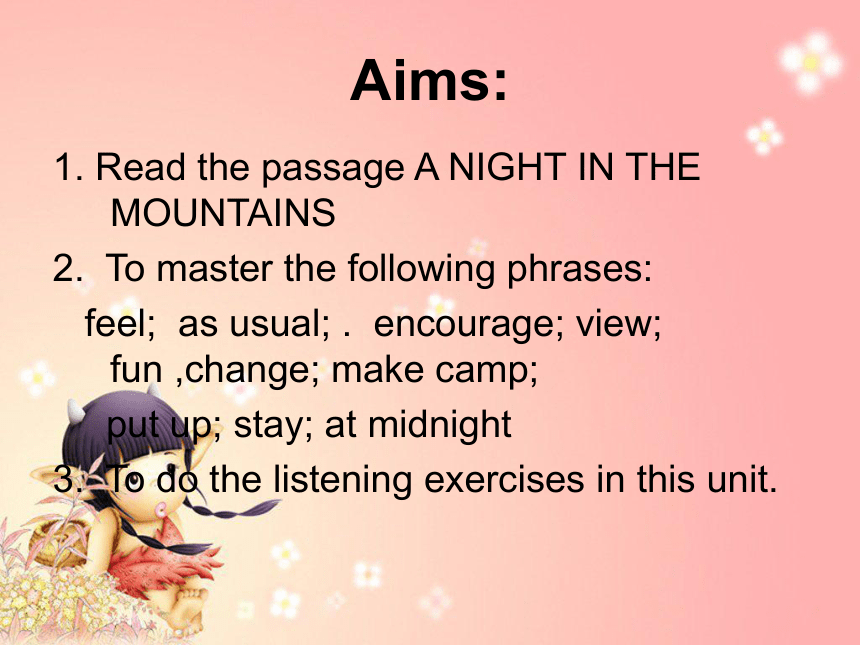
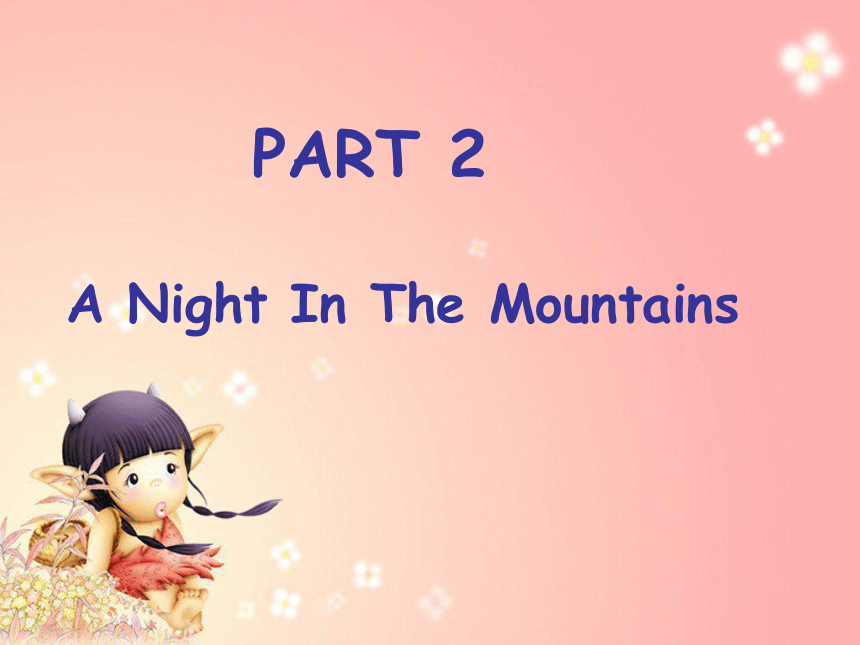



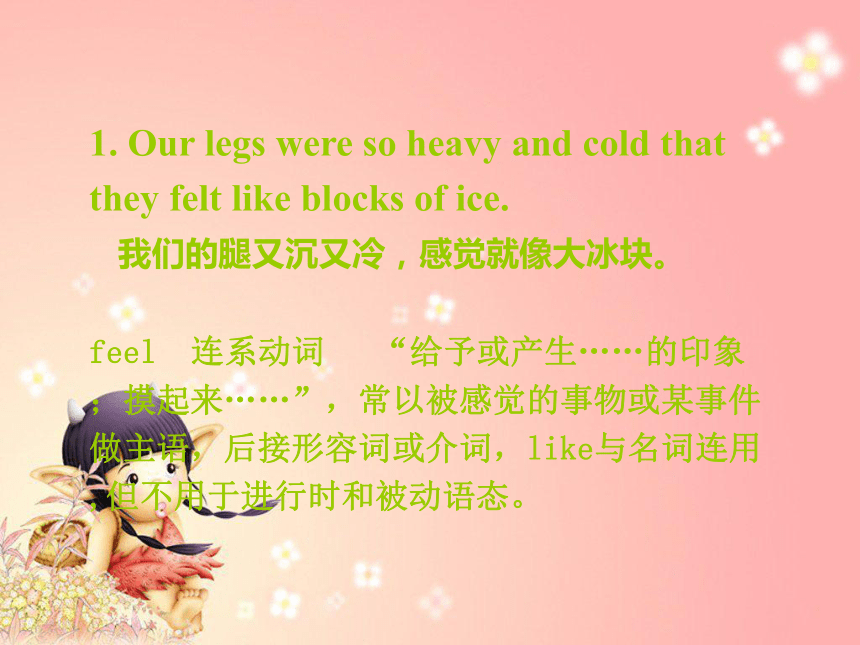

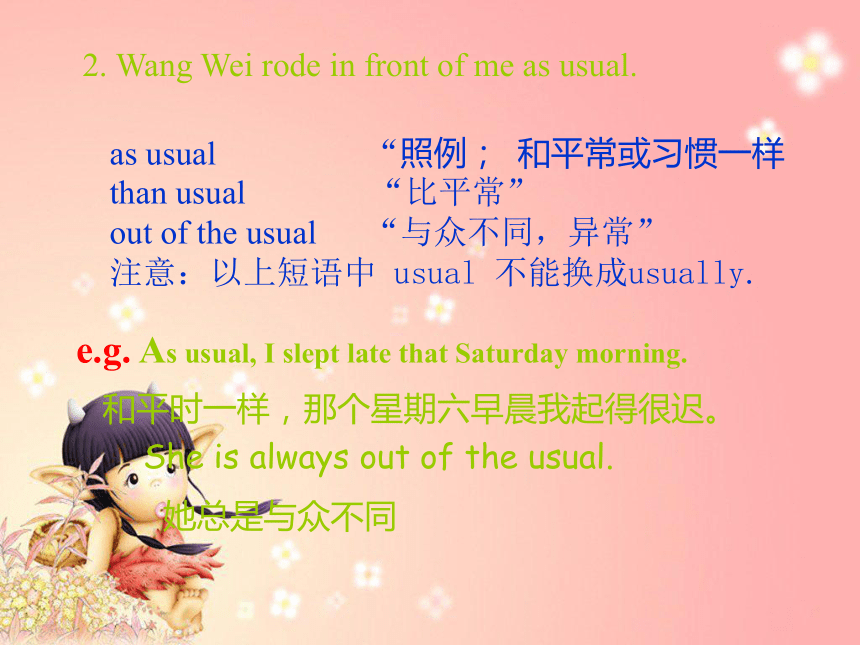
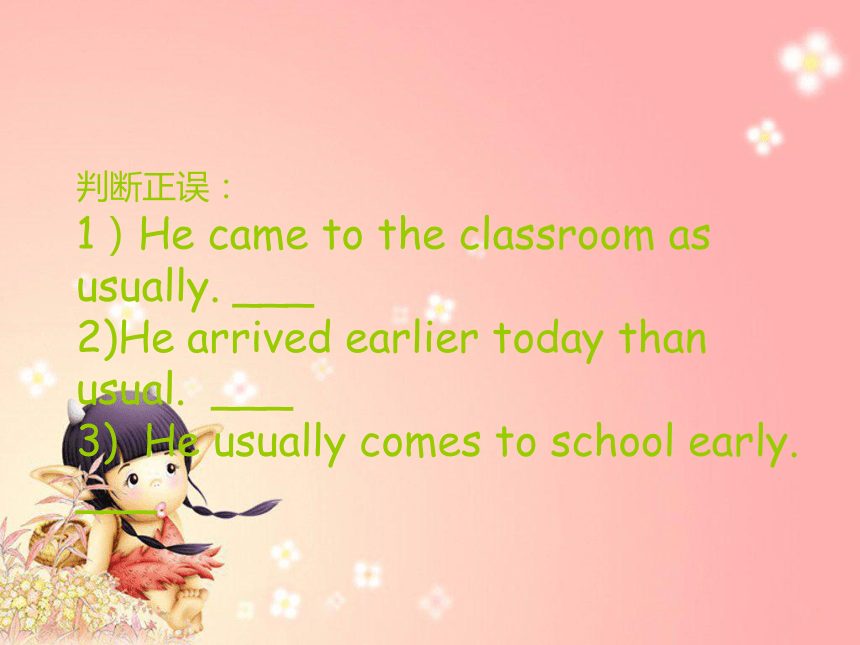


文档简介
课件30张PPT。Period 6
Using languageUnit 3 Travel journalAims:1. Read the passage A NIGHT IN THE MOUNTAINS
2. To master the following phrases:
feel; as usual; . encourage; view; fun ,change; make camp;
put up; stay; at midnight
3. To do the listening exercises in this unit.PART 2 A Night In The MountainsReading --IFirst reading:①When they arrived in Tibet, it was winter then. ( )
②Wang Wei was behind me as usual. ( )
③When we reached a valley, it became warmer.( )
④After supper, we started making a camp. ( )
⑤Wang Kun went to sleep and Wang Wei stayed awake. ( )
⑥There was almost no wind on that night. ( )FFTFFTSecond reading:How does Wang Kun
feel about the trip now?Third readingFind the detailed information from the passage.In the early eveningAfter supperAt midnightWe _____ ______.made a campWang Wei ______ __ ____________ but I_______ _______.went tosleepstayed awakeThe sky _______ ___becameclearerThe stars _____ .werebrighterThere was only the sound of______fire1. Our legs were so heavy and cold that they felt like blocks of ice.
我们的腿又沉又冷,感觉就像大冰块。
feel 连系动词 “给予或产生……的印象;摸起来……”,常以被感觉的事物或某事件做主语,后接形容词或介词,like与名词连用,但不用于进行时和被动语态。 例如:
Your hands feel cold.
How does it feel to be home again after twenty years abroad?
2. Wang Wei rode in front of me as usual.as usual “照例; 和平常或习惯一样
than usual “比平常”
out of the usual “与众不同,异常”
注意:以上短语中 usual 不能换成usually.
e.g. As usual, I slept late that Saturday morning.
和平时一样,那个星期六早晨我起得很迟。She is always out of the usual.她总是与众不同判断正误:
1)He came to the classroom as usually. ___
He arrived earlier today than usual. ___
3) He usually comes to school early. ___3. She is very reliable and I knew I didn’t need
to encourage her.
她很可靠,我知道我用不着给她鼓励。
encourage vt. “鼓励,激励”,通常用于“encourage sb. to do sth.”这种结构。
e.g. He encouraged me to have a try.
她鼓励我试一试。他被那些英雄人物所激励。He was encouraged by the heroes. 1)encourage sb. to do sth. 鼓励某人做某事
discourage sb. from doing sth. 使某人不敢做某事
e.g. My father encouraged me to apply
for the job. 父亲鼓励我申请那份工作We ought to be focusing on discouraging
kids from smoking.
我们应重点去找你组孩子们不要抽烟。2). encouraging adj. 振奋人心的;激励的 encouraged adj. 受到鼓舞的
encouragement n. 鼓励
discourage vt. 使泄气
e.g. My advisor encouraged ____ a summer course to improve my writing skills.
for me taking B .me taking
C. For me to take D. me to take
Language points4. To climb the mountain road was hard work but as we looked around us, we were surprised by the view. 上山是件痛苦的事,但当我们环顾四周时,仍被看到的景象所震撼
1) 不定式作主语, 谓语动词用单数, 可以用形式主语it.e.g. To learn a foreign language is important for your future work.
=It is important for your future work to learn a foreign language.
Is it necessary to complete the design before National Day?2).view 在本句中表示“景色”,表示从某处看到的景色,风景,尤指自然美景。
e.g. I’d like a room with a view.
view 作名词还可以表示“视野”以及“观点”; “见解”,另外也可作动词,表示“观看”或“考虑”。
e.g. In my view it was a waste of time.
The lake comes into view.
How do you view your position in the company? 完成句子
1).He has an optimistic ____ ____ _____.
(人生观).
2)._____ _____ ______( 以我来看) ,aid to
the rebels should be stopped.
3).There was no one _____ _____ (看见)。
4). One of the advantages of living on the
top floor of a high rise is that you can
get a good _____.
view of lifeIn my view in viewview5. It was great fun especially as it gradually became
much warmer..
天气逐渐变得越来越暖和,让我们觉得尤其有趣。
1) fun 是不可数名词,表示“有趣的人或事”,还可
以表示“玩笑”,“嬉戏”。
e.g. Swimming in the sea is great fun on holiday.
Your new friend is great fun.
常见搭配:
have fun 玩乐 be fond of fun 喜欢开玩笑
for fun 为了好玩,为了高兴; in fun 闹着玩的,开玩笑的 make fun of 取笑 have a lot of fun 玩得很开心2)funny adj. 滑稽的,好笑的,有趣的,奇怪的,难以理解的。
e.g. I heard such a funny story this morning.
There is something funny about the matter.
6. At this point we had to change our caps, coats, gloves and trousers for T-shirts and shorts.
change “换衣, 更换”
Wait, it won’t take me long to change.change into 换上….衣服
You’re supposed to change into your working clothes.
get changed 换好衣服
change A for B 用A换B
7. In the early evening we always stop to make camp. 傍晚我们停下来宿营。
camp n. [C, U] 野营, 营地, 营帐 make camp 扎营, 宿营go camping 去露营, 去野营[短语]At weekends many Australians go walking or camping in the countryside, called the bush.8. We put up our tents and then we eat. 我们先搭起帐篷然后吃饭。put up① 举起, 抬起 = raise
② 挂起, 张贴
③ 建造, 搭起 = build
④ 住宿, 留宿e.g. He put up his hand to catch the teacher’s attention.
A new notice has been put up on the board.
A new theatre will be put up where there used to be a temple.
Will you put me up for the night?9. After supper Wang Wei put here head down on her pillow and went ro sleep but I stayed awake.
晚饭后,王薇就去睡觉了,我却睡不着。
stay 系动词 “保持(某种状态)”
e.g. The window stayed open all night. 2). stay 动词 “待;留(下);(暂)住”
e.g. I stayed with my friends last Saturday. 3). stay 作名词时是可数名词,“停留”;
“逗留”
e.g. I’ll make a short stay in Wuhan. 10. At midnight the sky became clearer and the stars grew brighter.
在午夜,天空变得更加晴朗了,星星更亮了。 e.g.
These animals only come out at night.
She doesn’t like to walk home late at night.at midnight 在午夜 at noon 在中午
at dawn 拂晓时 at daybreak 拂晓时
at dusk 在黄昏时 at night 在夜里 完成句子:
1)They start work _____ ___________ (天一亮)
2)The street lights go on _____ _____ (黄昏时分)at daybreak/dawn at duskWriting Have a nice/good time. Have a nice/good trip. Take care.
Good luck on your journey. Say “Hello” to …. Write to me.
Give my best/love wishes to …. Have fun. Writing 1. In pairs choose the details from the journey that are most interesting. Think of what else you would like to know about the journey. Write these ideas down as questions.
2. Now choose two or three of the best questions for your letter. Each question should have another sentence explaining why you want to know this information.3. Put them in an order that makes sense.
4.Begin your letter as shown in the textbook and add your questions for Wang Wei. Your writing should not be more than one paragraph.
5.Finish your letter as shown in the textbook.
Homework1. Finish writing the letter
2. Review the whole unit
3. Read the passage in workbook( page 59) “The end of our journey ”
Using languageUnit 3 Travel journalAims:1. Read the passage A NIGHT IN THE MOUNTAINS
2. To master the following phrases:
feel; as usual; . encourage; view; fun ,change; make camp;
put up; stay; at midnight
3. To do the listening exercises in this unit.PART 2 A Night In The MountainsReading --IFirst reading:①When they arrived in Tibet, it was winter then. ( )
②Wang Wei was behind me as usual. ( )
③When we reached a valley, it became warmer.( )
④After supper, we started making a camp. ( )
⑤Wang Kun went to sleep and Wang Wei stayed awake. ( )
⑥There was almost no wind on that night. ( )FFTFFTSecond reading:How does Wang Kun
feel about the trip now?Third readingFind the detailed information from the passage.In the early eveningAfter supperAt midnightWe _____ ______.made a campWang Wei ______ __ ____________ but I_______ _______.went tosleepstayed awakeThe sky _______ ___becameclearerThe stars _____ .werebrighterThere was only the sound of______fire1. Our legs were so heavy and cold that they felt like blocks of ice.
我们的腿又沉又冷,感觉就像大冰块。
feel 连系动词 “给予或产生……的印象;摸起来……”,常以被感觉的事物或某事件做主语,后接形容词或介词,like与名词连用,但不用于进行时和被动语态。 例如:
Your hands feel cold.
How does it feel to be home again after twenty years abroad?
2. Wang Wei rode in front of me as usual.as usual “照例; 和平常或习惯一样
than usual “比平常”
out of the usual “与众不同,异常”
注意:以上短语中 usual 不能换成usually.
e.g. As usual, I slept late that Saturday morning.
和平时一样,那个星期六早晨我起得很迟。She is always out of the usual.她总是与众不同判断正误:
1)He came to the classroom as usually. ___
He arrived earlier today than usual. ___
3) He usually comes to school early. ___3. She is very reliable and I knew I didn’t need
to encourage her.
她很可靠,我知道我用不着给她鼓励。
encourage vt. “鼓励,激励”,通常用于“encourage sb. to do sth.”这种结构。
e.g. He encouraged me to have a try.
她鼓励我试一试。他被那些英雄人物所激励。He was encouraged by the heroes. 1)encourage sb. to do sth. 鼓励某人做某事
discourage sb. from doing sth. 使某人不敢做某事
e.g. My father encouraged me to apply
for the job. 父亲鼓励我申请那份工作We ought to be focusing on discouraging
kids from smoking.
我们应重点去找你组孩子们不要抽烟。2). encouraging adj. 振奋人心的;激励的 encouraged adj. 受到鼓舞的
encouragement n. 鼓励
discourage vt. 使泄气
e.g. My advisor encouraged ____ a summer course to improve my writing skills.
for me taking B .me taking
C. For me to take D. me to take
Language points4. To climb the mountain road was hard work but as we looked around us, we were surprised by the view. 上山是件痛苦的事,但当我们环顾四周时,仍被看到的景象所震撼
1) 不定式作主语, 谓语动词用单数, 可以用形式主语it.e.g. To learn a foreign language is important for your future work.
=It is important for your future work to learn a foreign language.
Is it necessary to complete the design before National Day?2).view 在本句中表示“景色”,表示从某处看到的景色,风景,尤指自然美景。
e.g. I’d like a room with a view.
view 作名词还可以表示“视野”以及“观点”; “见解”,另外也可作动词,表示“观看”或“考虑”。
e.g. In my view it was a waste of time.
The lake comes into view.
How do you view your position in the company? 完成句子
1).He has an optimistic ____ ____ _____.
(人生观).
2)._____ _____ ______( 以我来看) ,aid to
the rebels should be stopped.
3).There was no one _____ _____ (看见)。
4). One of the advantages of living on the
top floor of a high rise is that you can
get a good _____.
view of lifeIn my view in viewview5. It was great fun especially as it gradually became
much warmer..
天气逐渐变得越来越暖和,让我们觉得尤其有趣。
1) fun 是不可数名词,表示“有趣的人或事”,还可
以表示“玩笑”,“嬉戏”。
e.g. Swimming in the sea is great fun on holiday.
Your new friend is great fun.
常见搭配:
have fun 玩乐 be fond of fun 喜欢开玩笑
for fun 为了好玩,为了高兴; in fun 闹着玩的,开玩笑的 make fun of 取笑 have a lot of fun 玩得很开心2)funny adj. 滑稽的,好笑的,有趣的,奇怪的,难以理解的。
e.g. I heard such a funny story this morning.
There is something funny about the matter.
6. At this point we had to change our caps, coats, gloves and trousers for T-shirts and shorts.
change “换衣, 更换”
Wait, it won’t take me long to change.change into 换上….衣服
You’re supposed to change into your working clothes.
get changed 换好衣服
change A for B 用A换B
7. In the early evening we always stop to make camp. 傍晚我们停下来宿营。
camp n. [C, U] 野营, 营地, 营帐 make camp 扎营, 宿营go camping 去露营, 去野营[短语]At weekends many Australians go walking or camping in the countryside, called the bush.8. We put up our tents and then we eat. 我们先搭起帐篷然后吃饭。put up① 举起, 抬起 = raise
② 挂起, 张贴
③ 建造, 搭起 = build
④ 住宿, 留宿e.g. He put up his hand to catch the teacher’s attention.
A new notice has been put up on the board.
A new theatre will be put up where there used to be a temple.
Will you put me up for the night?9. After supper Wang Wei put here head down on her pillow and went ro sleep but I stayed awake.
晚饭后,王薇就去睡觉了,我却睡不着。
stay 系动词 “保持(某种状态)”
e.g. The window stayed open all night. 2). stay 动词 “待;留(下);(暂)住”
e.g. I stayed with my friends last Saturday. 3). stay 作名词时是可数名词,“停留”;
“逗留”
e.g. I’ll make a short stay in Wuhan. 10. At midnight the sky became clearer and the stars grew brighter.
在午夜,天空变得更加晴朗了,星星更亮了。 e.g.
These animals only come out at night.
She doesn’t like to walk home late at night.at midnight 在午夜 at noon 在中午
at dawn 拂晓时 at daybreak 拂晓时
at dusk 在黄昏时 at night 在夜里 完成句子:
1)They start work _____ ___________ (天一亮)
2)The street lights go on _____ _____ (黄昏时分)at daybreak/dawn at duskWriting Have a nice/good time. Have a nice/good trip. Take care.
Good luck on your journey. Say “Hello” to …. Write to me.
Give my best/love wishes to …. Have fun. Writing 1. In pairs choose the details from the journey that are most interesting. Think of what else you would like to know about the journey. Write these ideas down as questions.
2. Now choose two or three of the best questions for your letter. Each question should have another sentence explaining why you want to know this information.3. Put them in an order that makes sense.
4.Begin your letter as shown in the textbook and add your questions for Wang Wei. Your writing should not be more than one paragraph.
5.Finish your letter as shown in the textbook.
Homework1. Finish writing the letter
2. Review the whole unit
3. Read the passage in workbook( page 59) “The end of our journey ”
